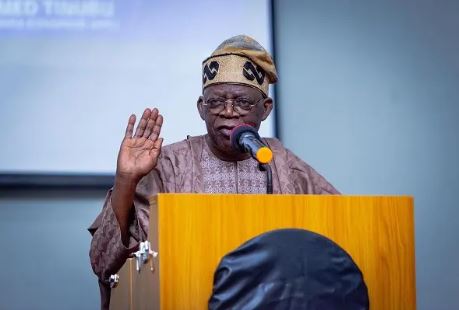In Nigeria’s presidential election, a candidate must secure at least 25% of the votes in two-thirds of the 36 states and the FCT in order to be announced as the victor.
The Independent National Electoral Commission (INEC) has clarified the controversy surrounding the requirement for a presidential candidate to score 25% of votes cast in the Federal Capital Territory (FCT) in Nigeria’s presidential election. According to INEC, the presidential candidate of the All Progressives Congress (APC), Bola Tinubu, did not have to score 25% of the votes cast in the FCT before being declared the winner of the election.
To be declared the winner of Nigeria’s presidential election, a candidate must score 25% of votes cast in two-thirds of the 36 states and the FCT. This means a candidate must win 25% of the votes cast in at least 24 states and the FCT. Mr Tinubu won 25% of the votes cast in 29 states but secured only about 18.99% in the FCT.
Atiku Abubakar, the presidential candidate of the Peoples Democratic Party (PDP), in a joint petition with the PDP, challenged Mr Tinubu’s victory on the grounds that the former Lagos State governor failed to secure the statutory 25% of votes cast in two-thirds (24 states) and the FCT. The Labour Party’s Peter Obi, who came third in the election, is also challenging Mr Tinubu’s victory in court, arguing that the president-elect failed to secure up to 25% of the votes in Abuja.
However, in a preliminary objection to Atiku’s petition, the electoral umpire argued that there was no basis for the call for “a run-off and/or nullification of the said election.” INEC explained that Mr Tinubu had satisfied the requirement of the constitution to be declared the winner of the presidential election by scoring 25% of the valid votes cast in 29 states, rendering the requirement of having 25% of the valid votes cast in the FCT unnecessary.
Citing section 134 (2) (b) of the constitution, INEC contended that its declaration and return of Mr Tinubu “was not wrongful…having scored one-quarter of valid votes cast in 29 states which is beyond the constitutional threshold for declaration.” It further argued that Nigeria’s constitution confers the status of a state on the FCT (Abuja) “and ought to be recognised as one of the states of the federation.”
INEC explained that the FCT, beyond being the Capital of Nigeria, has no special status over and above the other 36 states of the federation to require a candidate in the presidential election to obtain at least 25% of the votes cast in the FCT before being declared the winner of the presidential election. INEC inferred that the framers of the Nigerian constitution intended a presidential candidate to have “a national geographical spread and broad acceptability from the Nigerian electorate and not meant to bestow a veto power on the FCT or its electorate over the election of a candidate at a presidential election who has otherwise scored one-quarter of the votes cast in two-thirds of the 36 states except in the FCT.”
